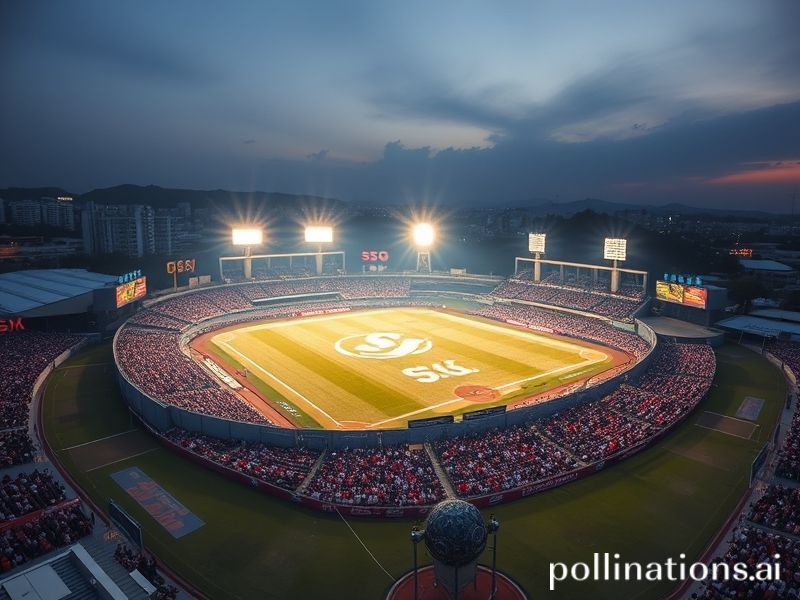How the SSG Landers Became the World’s Most Intriguing Hedge Against Geopolitical Chaos
A Peninsula, a Ballpark, and the Slow-Motion Existential Crisis of the SSG Landers
By Our Correspondent in the Departure Lounge, Incheon
It is a truth universally acknowledged that when a global shipping titan decides baseball is the next great hedge against geopolitical whiplash, the world has officially run out of sane hobbies. Last year, SSG—a conglomerate whose cranes dominate more ports than most nations have diplomats—purchased the SK Wyverns, rebranded them the “Landers,” and began running a KBO franchise the same way it schedules container routes: on time, on budget, and with a stowaway clause for existential dread.
From Busan to Brooklyn, the transaction landed like a well-placed curveball. Analysts who normally parse grain futures suddenly had opinions about bull-pen ERAs. ESPN, hungry for anything live that isn’t a Zoom funeral, streamed Landers games at 3 a.m. New York time, thereby proving that insomnia is America’s last growth sector. Meanwhile, European insomniacs—already rattled by energy prices that resemble crypto charts—tuned in wondering if South Korea had finally weaponized boredom. Spoiler: it has, and the broadcast graphics glow like a Bloomberg terminal having a panic attack.
Globally, the Landers matter because they are a case study in late-capitalist diversification. When shipping rates swung from “historic windfall” to “please hold” faster than a North Korean missile alert, SSG’s executives needed a revenue stream less cyclical than the Baltic Dry Index. Baseball, with its 144-game grind and merch potential, looked positively Zen. After all, nothing says “stable cash flow” like selling jerseys to fans whose retirement plans consist of hoping their apartment building doesn’t collapse.
The international implications ripple outward like a poorly secured container overboard. First, there’s the soft-power angle: South Korea exporting another cultural product that isn’t K-pop or Oscar-winning parasites. The Landers’ overseas fan clubs now compete with K-drama forums for bandwidth, proving once again that humanity will binge anything if the Wi-Fi holds. Second, the purchase validates a growing trend—sovereign-adjacent conglomerates treating sports franchises as balance-sheet mood rings. If SSG can flatten volatility with a left-handed reliever, expect Maersk to buy Ajax and Amazon to acquire the Mariners, presumably renaming them the Prime Deliveries.
Then there’s the geopolitics. The Landers play in Incheon, a city closer to Pyongyang than Seoul is to its own suburbs. Every seventh-inning stretch is thus an unlit fuse: a stadium full of citizens stretching while Kim Jong-un decides whether today is a missile-test day or merely a strongly worded statement day. The club’s marketing department gamely leans in, offering “Détente Dugout” seats and kimchi-topped nachos marketed as “Fusion for Peace.” Dark, yes, but so is selling season tickets behind artillery range.
Attendance, however, remains robust—proof that nothing inoculates against dread like communal chanting and overpriced beer. The Landers’ fans, clad in red-trimmed space-age uniforms, look like extras who wandered off the set of a Netflix dystopia. They belt out fight songs whose hooks are scientifically engineered to survive TikTok. International viewers, deprived of affordable therapy, mistake the spectacle for catharsis. They’re not wrong; the human brain hasn’t evolved past “group scream at orb” since the Bronze Age.
For the players, the stakes are both microscopic and galactic. A utility infielder batting .220 is one slump away from being sent down to the minors—or recruited by a Japanese squad dangling a lifetime supply of Cup Noodles. Meanwhile, MLB scouts circle like vultures with signing bonuses, reminding everyone that athletic labor is the last truly global gig economy. The Landers’ ace pitcher, signed from the Dominican Republic for what an adjunct professor makes in a decade, now fields questions about the Hanwha Eagles like a UN translator on deadline.
And yet, amid the absurdity, there is something almost quaint: a belief that nine innings can still impose narrative order on a planet spiraling into algorithmic chaos. When the Landers win, the stock ticker at SSG headquarters blinks green; when they lose, analysts blame the closer and not, say, the Suez Canal. It is comforting, in a delusional sort of way, to pretend that a sacrifice fly can offset supply-chain doom.
So the Landers play on, a floating fortress of artificial turf in a sea of real-world volatility. Somewhere off the coast, container ships idle, burning fuel priced like printer ink, waiting for ports that may or may not open tomorrow. But inside the ballpark, the organ plays, the beer flows, and the scoreboard insists the only deficit that matters is on the field. For three hours, humanity agrees to pretend that’s true. Then the lights dim, the cranes resume their mechanical ballet, and we all remember the final score: Capitalism 7, Existential Angst 6, bottom of the ninth, no outs, bases loaded, history warming in the bullpen.







